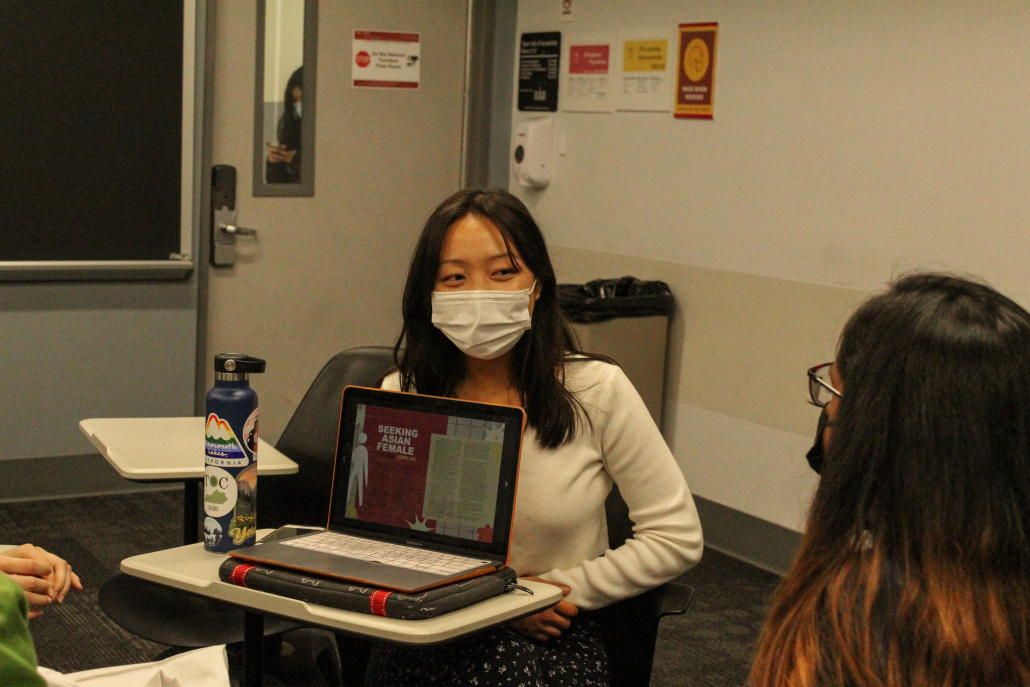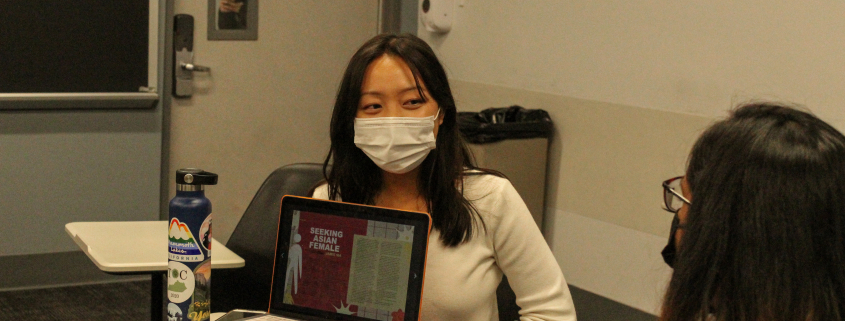Descent Magazine launches second issue with in-person release party

Students wandered around Taper Hall Friday night, admiring Descent Magazine’s second issue and celebrating the organization’s first in-person event since its founding during the coronavirus pandemic. The issue, themed “develop//deconstruct,” featured a variety of artistic mediums, including short stories, poems and photography.
Flipping through the magazine’s online issue on the several computers dispersed across the room, attendees finally had the chance to see the colorful, eclectic and scrapbook-inspired issue. Co-editors-in-chief, Long Le and Nancy Liu, introduced the issue and its contributors, many of whom gave short speeches explaining the inspiration behind their work.
Conceptualized at the end of 2020, Descent Magazine is USC’s first Asian Pacific Islander Desi American arts magazine and officially launched in January 2021. Digitally published every semester, Descent is sponsored by media companies that highlight a multitude of Asian American experiences, including Kaya Press, Lantern Review and Just Like Media.
The magazine’s title is also a homophone of “dissent,” a word most often used in the context of social change, Liu said. As the name suggests, the magazine aims to “encourage people to think more critically” while simultaneously honoring past ancestors.
In the wake of increasing anti-Asian sentiment and the Stop Asian Hate movement, Liu said it was even more important to provide space for Asian representation in the magazine and in publication spaces on campus. Determined to create a platform that allowed for APIDA creatives to freely express their ideas and cultural identities, Liu invited Le and, together, founded Descent Magazine.
“We started before the #StopAsianHate movement really started last spring, but it’s really influenced how we’ve moved forward with the magazine,” said Liu, a senior majoring in public relations. “[The movement] showed us just how political we are as an arts magazine. Art is inherently political, especially when it’s about identity.”
Descent, which is completely student-run by members of the APIDA community, looks “to elevate and amplify APIDA voices by nurturing a space where they can showcase their artwork, stories and other creations,” according to their website.
Acknowledging the lack of APIDA representation in publications on campus, Le embraced the opportunity to lift up APIDA artists at USC through the founding of Descent.
“I’ve always wanted to do something more for the APIDA community at USC,” Le said. “I found that this was a really interesting and creative way that I could get involved.”
While the publication started out small, Liu said Descent has since expanded its team and reach this semester by taking on staff photographers and writers and developing a tighter-knit community.
Staff writer Echo Tang, a junior majoring in quantitative biology, contributed a collection of short stories titled “it comes and goes.” Tang’s stories all share a common theme about the loss and revaluation of relationships, though the stories largely feature nameless and faceless people.
As an in-house contributor to the magazine, Tang has found a space to embrace and develop her creative writing skills — something she does not get to do often within the academic restraints of her major.
“USC doesn’t have any APIDA arts collective, and I am a quantitative biology major, so I don’t get to do this stuff a lot and I don’t get to write for myself a lot,” Tang said. “I wanted to take this chance and explore my own creative voice, and some of my own ideas and thoughts in a space I thought was safe for an individual like me.”
For staff writer Jamie Ma, Descent has allowed APIDA students to discover a space to embrace invention and share their work with the USC community at large. Descent’s issue includes a short story by Ma about the sociopolitical implications of interracial relationships involving Asian women.
“I joined Descent … because I wanted a place that focused on my identity and my creative work in conjunction with each other,” said Ma, a sophomore majoring in environmental studies and East Asian languages and culture. “Descent, to me, recognizes the idea that all writing is autobiographical — my writing cannot be separated from my identity as an Asian American woman, and to produce work that is meaningful requires a creative freedom and support that I felt I could only or mostly get from Descent.”
Ma hopes to illustrate the multifaceted nature of the APIDA community, which is often labeled as the model minority. She said while the one-dimensional, studious stereotype largely defines views of the Asian community, in reality, there is much creativity the APIDA population has to offer.
“Descent is also the perfect environment and reminder to the student body that we, the APIDA community, are a people worthy of celebration,” Ma said. “We are intelligent and hard-working, yes, but we are creative and imaginative and artistic too.”
Though Le, a senior majoring in film and television production, described himself as not well-versed in publications, Descent Magazine has successfully launched two issues since the pandemic; the inaugural one in April centered around the theme “Liminal Spaces.”
In the new issue’s letter from the editors-in-chief, Le and Liu said the theme is meant to “reflect on established systems of the world and deconstruct and develop them to serve the world better.”
“We are one in the line of generations of Asians and Asian Americans, and so, the idea of ancestry and passing on a legacy is really important to us,” Liu said.

